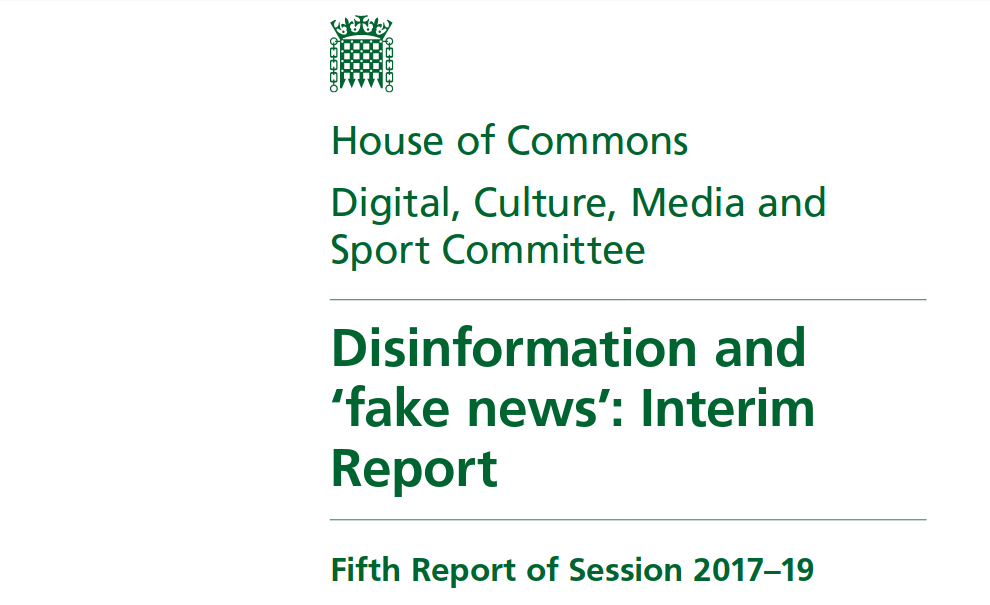by Gary Herman
Four decades ago, when the Campaign was launched, the media landscape in Britain looked very different. We lived in an analogue age that was before the arrival of giant global advertising machines like Google and Facebook. It was before the launch of smartphones that gave everyone who owned one a window on the internet they could fit into a pocket. It was before Donald Trump and Brexit.
Now we face the mess of post-truth politics, alternative facts and fake news – or lies, propaganda and disinformation on a worldwide scale.
The interim report of the UK Parliament’s DCMS Committee into disinformation and “fake news” (published 29 July 2018) argues that disinformation is a “potential” threat to democracy. Wrong. It is a very real threat.
The report provides some useful basic information and analysis, and covers many familiar and some less familiar cases, including Trump’s election, the Brexit referendum, the referendum on Catalan independence and the persecution of Rohingya Muslims in Burma/Myanmar.
It looks at the role of individuals like Arron Banks, Robert Mercer, Steve Bannon, and Alexander Nix of Cambridge Analytica and SCL, and how companies like SCL have interfered with elections across the world. It devotes a whole chapter to “Russian Influence in Political Campaigns”.
Perhaps the most sobering aspect of the report is its analysis of the part played by Facebook in all this. In one section it draws attention to Facebook’s Free Basics service. This, says the report, “is a Facebook service that provides people in developing countries with mobile phone access to various services without data charges. This content includes news, employment, health information and local information”.
Free Basics was launched in 2013 as internet.org, a partnership between Facebook and six major tech companies aimed at increasing Facebook’s market in the developing world. The name was changed to Free Basics in 2015.
Many critics saw it as undermining the principles of “net neutrality”. This was essentially the criticism offered by the Telecom Regulatory Authority of India (TRAI) when it pulled out of Free Basics in 2016, accusing Facebook of running misleading ads and “Astroturfing” (giving the false impression that its service was the product of a grassroots movement).
Free Basics is used by an estimated 100m people in 63 countries, and Facebook relentlessly pursues its quest to build a global market.
What’s at issue here is the appearance that Facebook and other social media companies give of being nothing more than “platforms” – disinterested parties in the business of content provision. This is how disinformation has grown to the point where it might legitimately be said to threaten the security of the world.
Take the DCMS report’s brief look at the part Facebook played in what many people now recognise as the Rohingya genocide in Burma/Myanmar. The committee notes that the 30m monthly Facebook users in Burma/Myanmar are mostly using Free Basics which gives them some kind of internet access but “severely limits the information available to users”.
“Facebook,” says the report, “is virtually the only source of information online for the majority of people in Burma.”
And that’s how Facebook played a key role in creating the Rohingya genocide, according to the UN, because it provided a space for hatred.
The situation in Burma was “awful”, said Facebook. They need to “do a lot more to get hate speech and all this kind of vile content off the platform”. But it does little to achieve this. For example, Mark Zuckerberg recently said that Facebook couldn’t take down posts that deny the Holocaust because people get things wrong. “I don’t think that they’re intentionally getting it wrong,” he said, “but I think it’s hard to impugn intent and to understand the intent.”
Such an opinion at the top of Zuckerberg’s company demonstrates the failure of social media to accept their responsibility as publishers. Platforms, remember, don’t do editorial. And such attitudes feed back into mainstream media under the influence of increasing competition for audiences and the advertising revenue that follows.
Result: a race to the bottom.
Social media are media and must be edited and regulated in the way that other media are: by human beings using experience and wisdom.
Because they are global the regulation must be global too. Think international copyright treaties or marine conventions. Maybe that’s where the missing taxes of social media giants should go. Regrettably, the DCMS Committee sees the answer in greater digital literacy and consumer education, which lets media owners, including Zuckerberg, off the hook.
This article was first published in CPBF’s journal Free Press No 216.

Leave a Reply